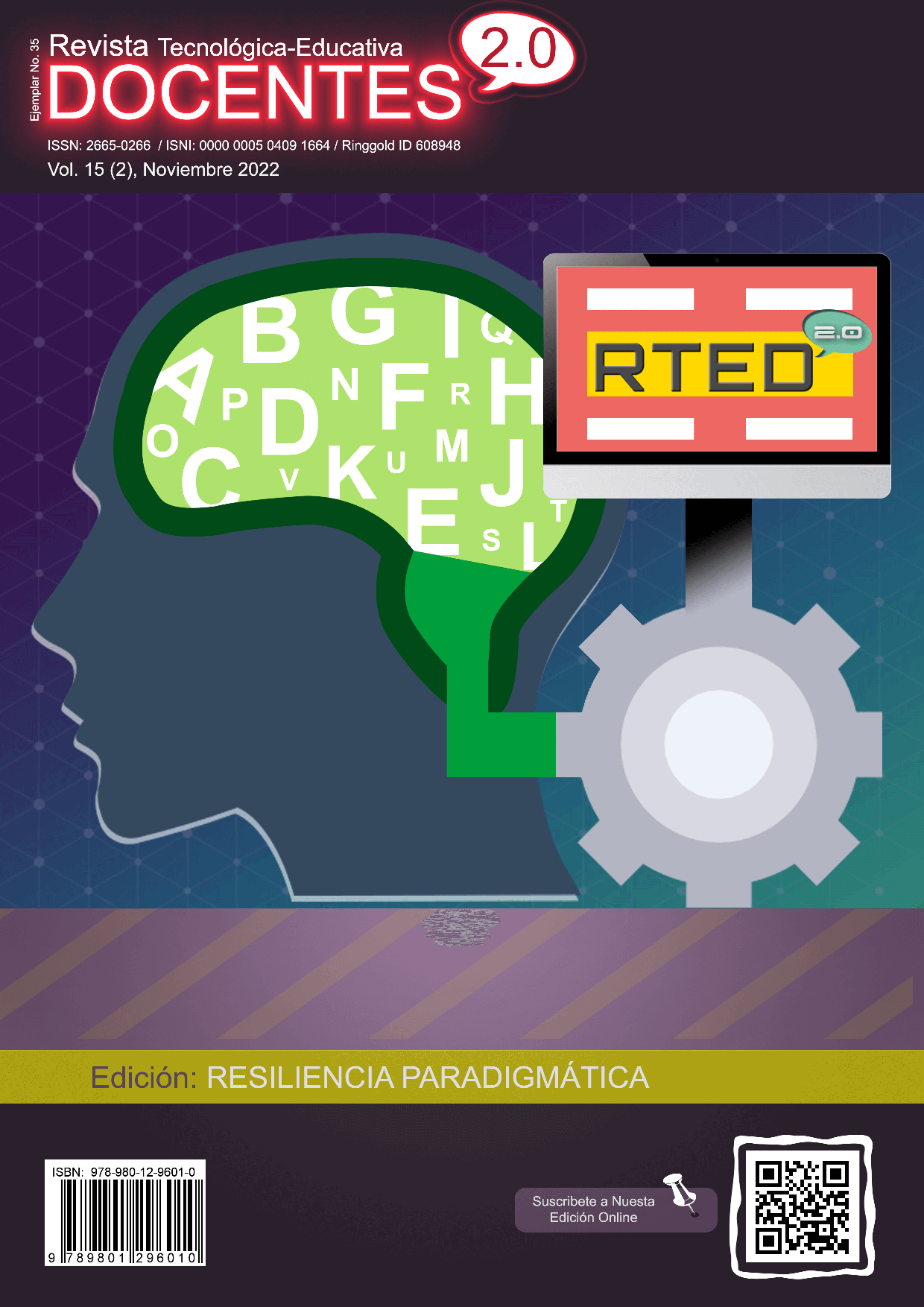Curriculum Design in Higher Distance Education Focused on the Self-Determination of Motivation
 DOI:
https://doi.org/10.37843/rted.v15i2.335
DOI:
https://doi.org/10.37843/rted.v15i2.335
Main Article Content
Abstract
Higher education in Mexico, since its inception, has faced enormous lags that prevent the well-being of the country's population. One of the main problems of the educational system in Mexico is that, despite the joint efforts of the state and public and private education institutions, education is not guaranteed to most citizens. The research aimed to develop a methodology for creating higher-level distance study plans. The study was based on the analytical-synthetic method, pragmatic paradigm, mixed approach, sequential exploratory design, sequential type, and longitudinal cut. The total population of students of the Faculty of Informatics of the Autonomous University of Querétaro is 840, of which 87 students from different careers were selected through a convenience sample. For the methodological design, a systematic review and a survey instrument were carried out to collect the indicators of the context variables, characteristics, and needs of the students in distance study plans. For the analysis of the results, descriptive and reliable methods were used to support the research. As a result, a methodology was proposed for curriculum design based theoretically on the qualities of distance education. In future work, the design of a web system to support curriculum design based on the proposed methodology was proposed.
Downloads
Metrics
Article Details

This work is licensed under a Creative Commons Attribution-NonCommercial-NoDerivatives 4.0 International License.
Those authors who have publications in our journal accept the following terms:
- When a work is accepted for publication, the author retains rights of reproduction, distribution of his/her article for exploitation in all countries of the world in the format provided by our magazine and any other magnetic medium, optical, and digital.
- Authors will retain their copyright and guarantee the journal the right first to publish their work, which will be simultaneously subject to the Creative Commons Acknowledgment License (Attribution-NonCommercial-NoDerivatives 4.0 International (CC BY-NC-ND 4.0)). That allows third parties to copy and redistribute the material in any medium or format, under the following conditions: Acknowledgment - You must properly acknowledge authorship, provide a link to the license, and indicate if any changes have been made. You may do so in any reasonable way, but not in a way that suggests you have the licensor's endorsement or receive it for your use. NonCommercial - You may not use the material for a commercial purpose. NoDerivatives - If you remix, transform, or build from the material, you cannot broadcast the modified material. There are no additional restrictions - You cannot apply legal terms or technological measures that legally restrict you from doing what the license allows.
- Authors may adopt other non-exclusive license agreements to distribute the published version of the work (e.g., deposit it in an institutional archive or publish it in a monographic volume) provided that the initial publication in this journal is indicated.
- Authors are allowed and recommended to disseminate their work through the Internet (e.g., in institutional telematic archives, repositories, libraries, or their website), producing exciting exchanges and increasing the published work's citations.
- Request of withdrawal an article has to be done in writing by the author to the Editor, becoming effective after a written response from the Editor. For this purpose, the author or authors will send correspondence via e-mail: [email protected].
- The author will not receive financial compensation for the publication of his work.
- All Docentes 2.0 Journal publications are under the Open Journal System (OJS) platform at: https://ojs.docentes20.com/.
References
Asociación Nacional de Universidades e Instituciones de Educación Superior (2020). Anuario Educación Superior -Técnico Superior, Licenciatura y Posgrado. http://www.anuies.mx/informacion-y-servicios/informacion-estadistica-de-educacion-superior/anuario-estadistico-de-educacion-superior
Cándia-García, F. (2016). Diseño de un modelo curricular E-learning, utilizando una metodología activa participativa. RIDE Revista Iberoamericana Para La Investigación y El Desarrollo Educativo, 7(13), 147. https://doi.org/10.23913/ride.v7i13.240 DOI: https://doi.org/10.23913/ride.v7i13.240
Díaz-Barriga, F., Lule, M. D. L., Pacheco, D., Rojas, S., & Saad, E. (1984). Metodología de diseño curricular para la enseñanza superior. Editorial Trillas.
Fondón, M. A., Albizu, M., Pérez, J., Fuente, A., Torrente, M. del C., Covadonga-Nieto, A., Cándida, J., Lanvín, D., & Labra, J. (2008). Metodología para el diseño de un plan de estudios basada en competencias previas y aportadas.
Gobierno del Estado de Querétaro. (2015). Plan Estatal de Desarrollo 2016 - 2021. http://www.queretaro.gob.mx/BS_ped16-21/
Hernández-Sampieri, R., Fernández, C., & Baptista, P. (2010). Metodología de la Investigación. (5 Edición). McGraw Hill.
Islas-Torres, C. (2021). Conectivismo y neuroeducación: transdisciplinas para la formación en la era digital. CIENCIA Ergo Sum, 28(1), 1–13. https://doi.org/10.30878/ces.v28n1a11 DOI: https://doi.org/10.30878/ces.v28n1a11
Jiménez, Y. (2011). Breve historia de la educación superior mexicana: cinco siglos de exclusión social. Revista Universitaria. UPN.
Ley General de Educación Superior (2021). Decreto por el que se expide y se abroga la Ley para la Coordinación de la Educación Superior, Congreso General de los Estados Unidos Mexicanos. DOF 20/04/2021. https://www.dof.gob.mx/nota_detalle.php?codigo=5616253&fecha=20/04/2021
López, R. (2006). Hacia un sistema virtual para la educación en México. Apertura, 3.
Secretaría de Educación del Estado de Querétaro (2016). Programa Sectorial de Educación, Querétaro 2016-2021. http://coepesqro.org.mx/static/docs/REUNIONES/2016/2DA SESION ORDINARIA/DOCUMENTOS DE SOPORTE/8.a. Borrador PROSEQ 2016-2021 v7.pdf
Secretaría de Educación Pública. (2020). Principales Cifras del Sistema Educativo Nacional 2019 – 2020. Dirección General de Planeación, Programación y Estadística Educativa.
Secretaría de Educación Pública (2021). Acuerdo número 10/04/21 por el que se emiten las Reglas de Operación del Programa Fortalecimiento a la Excelencia Educativa para el ejercicio fiscal 2021. https://dof.gob.mx/nota_detalle.php?codigo=5639731&fecha=29/12/2021
Siemens, G. (2004). Conectivismo: Una teoría de aprendizaje para la era digital. Conectados En El Ciberespacio, 5, pp. 1–10.
Tovar, M. C., & Sarmiento, P. (2011). El diseño curricular, una responsabilidad compartida. Colombia Médica, 42(2).
Zubieta, J., & Rama, C. (2016). La Educación a Distancia en México. https://doi.org/10.13140/RG.2.1.1440.9360






